Nonetheless, the big question remains, why does my bike tire keep popping. We’re going to answer that in this article.
Your bike tires could pop based on visible problems like a blow-out, puncture, dirty or invisible problems like bad valve connect, bad seal amongst others.
Maintaining a car is far more complex than keeping a bike in the right frame. Notwithstanding, one of the many worries bike owners have is dealing with popping tires.
If it’s been more than a week since you last pumped it, your tire is likely still in good condition.
It’s no news that tires gradually lose their air pressure as you use them but it helps to properly inflate them regularly.
We will get into the details in this post, so you have a proper understanding of the reasons why your bike tires keep popping.
Let’s get to it.
Table of Contents
Major reasons your bike tires keep popping
- Blowout
- Puncture
- Dirty Valve
- Bad valve connection
- Bad seal
- Burping
The reasons for this can be categorized into visible problems, invisible problems from the outside and invisible problems from the inside.
Let’s get into the full explanation of these issues that could make your bike tire burp.
Visible problems
There are a few issues with your tires that are completely obvious from the outside. You’ll have to remove the tire and tube from your wheel to address the leak.
However, while riding, this isn’t always possible.
These issues are the easiest to spot and here are a few of them:
Blowout
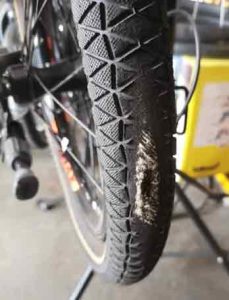
A blowout most often causes a flat tire. Blowout occurs when your tire tube is not properly seated (kept in) by the tire and wheel and extends beyond them.
It is critical to properly set a new tube and tire before inflating to the proper pressure.
When you notice that your tube is bursting out of the tire, remove the pump and immediately cover your ears.
If your tire’s wall has a tear or a weak point in it, a blowout will occur.
Although a tear of that nature is unlikely to affect new tires, it becomes more common in old tires as they wear out from side impacts over time.
Doing a quick visual inspection of your tires regularly can help avoid blowouts. It is also important to be cautious when installing a new tube.
Puncture
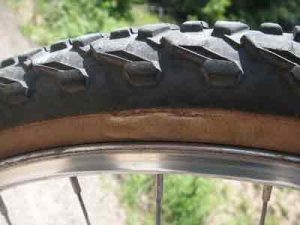
Usually, punctures are the cause of a flat tire. Something must have punched a hole right through your tire and into the inner tube of your tire and tube.
They don’t always burst with the force that you’d expect from a balloon. For punctured tires, lower leaks are more common than hissing leaks.
By leaning your bike against something, you may slowly rotate the tire. Alternatively, if you don’t have something to lean it against, you can simply roll it forward with one hand.
In the area where your tire would come into touch with the ground, look for a little pin-sized hole or other foreign objects.
Also, softly run your finger over the tire’s surface. Our fingers have a special talent for detecting minute irregularities.
You may check for punctures by inflating your tire again and rotating it slowly while listening for leaks.
If you do not have access to your floor pump, you should bring an emergency pump with you to use in an emergency situation.
It is also possible to detect whether the leak is rapid or slow by inflating your tire. If you discover a hole in your inner tube, you must replace it as soon as possible.
It is acceptable to put off changing the tire for the time being, but make sure to gently run your finger over the inside of the tire while replacing the inner tube.
Getting rid of the thorn or whatever it was that caused your tube to pop will be a major undertaking.
Dirty valve
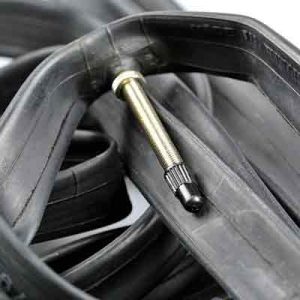
If you don’t notice any holes, the next thing to look for is a faulty valve. Because they can become loose, or because dirt from the road can seep through, they can hinder the seal from properly sealing itself.
Inflate the tube while keeping an ear out for the valve to open and shut. If you hear hissing, you’ll need to use a valve core tool or take it to a bike shop to have it repaired.
To check for leaks, pour water on the stem and watch for bubbles to determine if there are any. Soapy water is the most effective solution.
Make sure to maintain your valve regularly and to cover it with a cap to prevent this from happening again.
If you don’t have thin road bike tires, you may need Schrader valve caps, which are identical to automobile valve caps in appearance and functionality.
Invisible from the outside problem
The area around the tire and valve has been thoroughly inspected at this point, but the tire and tube remain attached to the wheel.
The problem comes when you can’t locate the problem. You’ll need to remove the tire and tube and start checking all over again because the tire isn’t holding any air.
Here are some other possible causes of your tire popping:
Puncture
To be clear, punctures in your inner tube can occur even when there are no holes in the tire. The most common type of hole is called a “snake bite.”
A pebble or curb can compress your inner tube against the metal wheel, resulting in two short holes in the tube.
When this happens, your tire’s inner tube will bulge out. As long as the snake bite is mild and you have a large enough patch, you should be able to cover it and get back on the bike.
Although the puncture could be huge or oddly shaped, depending on how low your tire pressure was and how hard you hit the obstruction.
It is unlikely that the puncture will require more than a basic repair.
The sealant you put in the tire will fill up and enclose the regions where inner tubes would lose pressure if the tire were to deflate completely.
If minor punctures are no longer the source of the problem, it is only the larger punctures that are left to worry about.
Even though snake bites are highly unlikely, a broken rim is not out of the question.
Because tubeless tires operate at a lower pressure than conventional tires, it is much easier to puncture a hole and have it extend all the way to the rim.
Since the tubeless tires are still rather thick, you won’t be able to cut all the way through them with your knife.
The energy is simply transmitted into the rim, which then bends back inward. If a puncture in your tubeless tires is severe enough to cause a leak, you will notice it immediately.
Fortunately, you can always keep a spare inner tube available, which you may install into your tire to get you back to your destination.
Bad valve connection
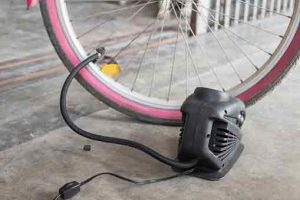
If you don’t align the tube with the wheel correctly during installation, it can put unnecessary stress on the tube where the valve is attached.
As the tube ages, deflates and is reinflated, the area where the valve attaches to the tube may develop leaks at the point where the valve connects to the tube.
Although this is not a common problem, exercising caution during the installation process can completely prevent it.
Identifying this problem can be accomplished by either pumping up the tire and listening for hissing noises.
You can also run the tire underwater and look for bubbles in the air.
The best thing to do is to replace the tube at this point since a hole in this area is significantly more difficult to repair than a hole in another area.
Invisible problems
There are some bike tire problems that can’t be easily detected. Nonetheless, when you notice it, you need to repair or replace it.
Here are a few examples of such problems:
Bad seal
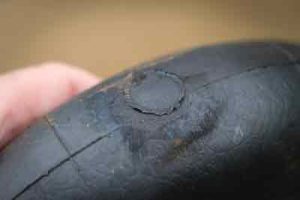
If your tire is unable to keep a lot of air pressure away, then you have not properly sealed it.
At this point, the best course of action is to remove the tire, clean everything, and start over from the beginning.
As a result, make sure you have some extra sealant on hand just in case something happens to the original.
Burping
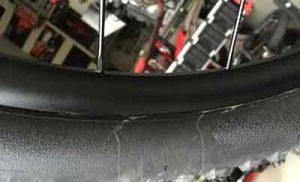
Tubeless tires are capable of forming a “burp.” To keep the tire from sliding off the wheel, it is equipped with a lip, which is known as the bead.
The tire will briefly detach from the wheel and some air will escape if you hit a pothole or a curb with enough force to remove it from the wheel. A “burp” is exactly what it sounds like.
Also, burping is not very common, and it has no immediate effect on the air pressure in your tires.
Keep an eye on how much your tires are compressing if you’re riding tubeless and you’re striking large holes regularly.
You can always take a brief halt and pump your tires to restore pressure if the situation demands it.
Conclusion
A collision impact alone can cause a tire blowout when driving over a really bad pothole, especially at high speeds.
As a result, it’s recommended to avoid potholes that appear to be dangerous, and steep curbs will lessen the risk of your tire popping.

